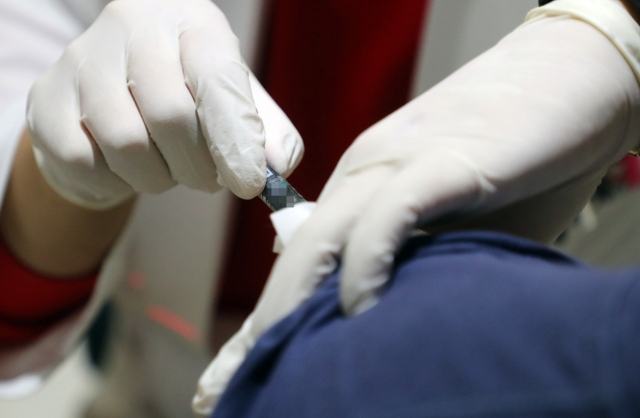 |
A healthcare worker administers a flu vaccine to a patient at a clinic in Seoul on Oct. 30, 2020. (Yonhap) |
As the summer heat gives way to the crisp autumn air, it's time to start thinking about protecting yourself and your loved ones from the flu.
If you’re a foreign national resident in South Korea, you may be eligible for free seasonal flu shots, one of many immunizations offered under the government's National Immunization Program, as long as you meet the same priority group criteria applied to Korean nationals.
Korea’s vaccine program covers for free 18 essential vaccines for infants and young children, including protection against measles, mumps, tuberculosis, diphtheria and polio. It also provides vaccines for certain adults, including hepatitis B shots for pregnant women, pneumococcal and flu vaccines for those 65 and older, typhoid fever and hemorrhagic fever with renal syndrome (HFRS) vaccines for those at high risk of exposure, and human papillomavirus (HPV) vaccines for girls aged 12-17 and low-income women aged 18-26.
The COVID-19 booster shot, though not part of the NIP, is also free for those 65 or older or members of high-risk, vulnerable groups.
For residents of foreign nationality, however, navigating the nitty-gritty details about these free or partly subsidized shots can be challenging due to the limited, piecemeal information available in languages other than Korean.
The Korea Disease Control and Prevention Agency offers an English website (https://nip.kdca.go.kr/irhp/index.jsp), but it primarily focuses on technical information for children's vaccines. This leaves other eligible groups -- adults, seniors and high-risk individuals -- without clear guidance as to which vaccines they're eligible for and where to get them.
To address this issue, we have compiled a guide based on the latest KDCA guidelines for the NIP.
3-month residency rule
The bottom line is that all residents are eligible regardless of their nationality, immigration status or enrollment in the National Health Insurance scheme.
Even if you haven't lived in Korea long enough -- six months -- to be automatically enrolled in the NHIS, you can get vaccinated as long as you've lived here for over three consecutive months.
For the flu shot, the country's annual vaccination program is currently underway, providing free shots to children aged 13 and under, pregnant women and adults aged 65 and over, with a phased rollout for each age group.
To receive free vaccinations, eligible individuals may simply present their residence card either at local public health centers ("bogeonso" in Korean) or designated medical institutions participating in the National Immunization Program. A list of participating clinics can be found on the KDCA website, though in Korean only.
Here's a tip for parents of newborns. While filling out the screening questionnaire, sign up for text alerts about upcoming vaccination appointments and requirements. The service is available in 12 languages plus Korean: Cambodian, Chinese, English, Filipino, Japanese, Lao, Mongolian, Nepali, Russian, Thai, Uzbek and Vietnamese.
No residence card? No problem!
Not all foreign residents hold a residence card. This may be the case for those on diplomatic (A-1), official (A-2), or treaty (A-3) visas that do not receive the card, or individuals who have overstayed their visa or entered the country without legal documentation.
Worry not -- public health centers in Korea can provide temporary management numbers for immunization, allowing those without proper ID to get tested if necessary and immunized. To obtain a temporary management number, individuals need to visit a local public health center and provide basic personal information such as their name, date of birth, address and phone number.
Prior to October 2021, foreign residents without valid identification were required to provide proof of employment to verify their eligibility for the immunization program. This requirement was lifted to promote wider vaccination coverage, based on the well-established scientific consensus that higher vaccination rates benefit public health as a whole.
Challenges remain
This inclusive approach has had significant implications for the estimated 423,000 unregistered foreign nationals in South Korea -- 16.9 percent of the total population of foreign national residents here.
While all residents are legally entitled to essential immunizations, economic burden and fears of exposing one's unregistered status have long posed barriers to accessing medical services.
A 2020 study by the government-affiliated Korea Institute for Health and Social Affairs found that 32 of 100 parents without legal immigration status reported foregoing necessary medical care for their children, with 21 citing financial constraints and four citing fear of revealing their immigration status as primary reasons.
Many residents and health care providers are still unaware of the free universal vaccination program, and this lack of awareness has sometimes kept eligible individuals from getting the essential shots, local reports show. A December 2023 Yonhap News article reports an incident where a public health center wrongfully denied a free flu shot to an unregistered child, insisting on seeing the parent's registration card.
The Korea Herald could not independently verify this report.
To help bridge this gap, many local governments, support groups and nonprofit organizations launched their own vaccination initiatives aimed at residents without legal immigration status -- especially children -- to complement the national immunization program available at state-run health centers.
Their efforts were critical at the height of the COVID-19 pandemic, as public health centers, overwhelmed with pandemic-related duties, struggled to keep up with routine immunization practices. Many of these initiatives have since become permanent fixtures, shaping how other vaccines are administered to foreign residents as well.
From May 2021 to April 2022, a joint initiative by 62 hospitals nationwide aimed at providing medical care to people without valid visas helped administer 426 vaccines to children, according to a report submitted to the National Assembly by Green Hospital, a Seoul-based general hospital that led the effort.
While the government took a more proactive role before lifting the pandemic restrictions in May 2023, running multilingual public awareness campaigns about vaccinations through various channels, local support groups and voluntary organizations have since taken the lead in promoting access to immunizations for unregistered residents.







